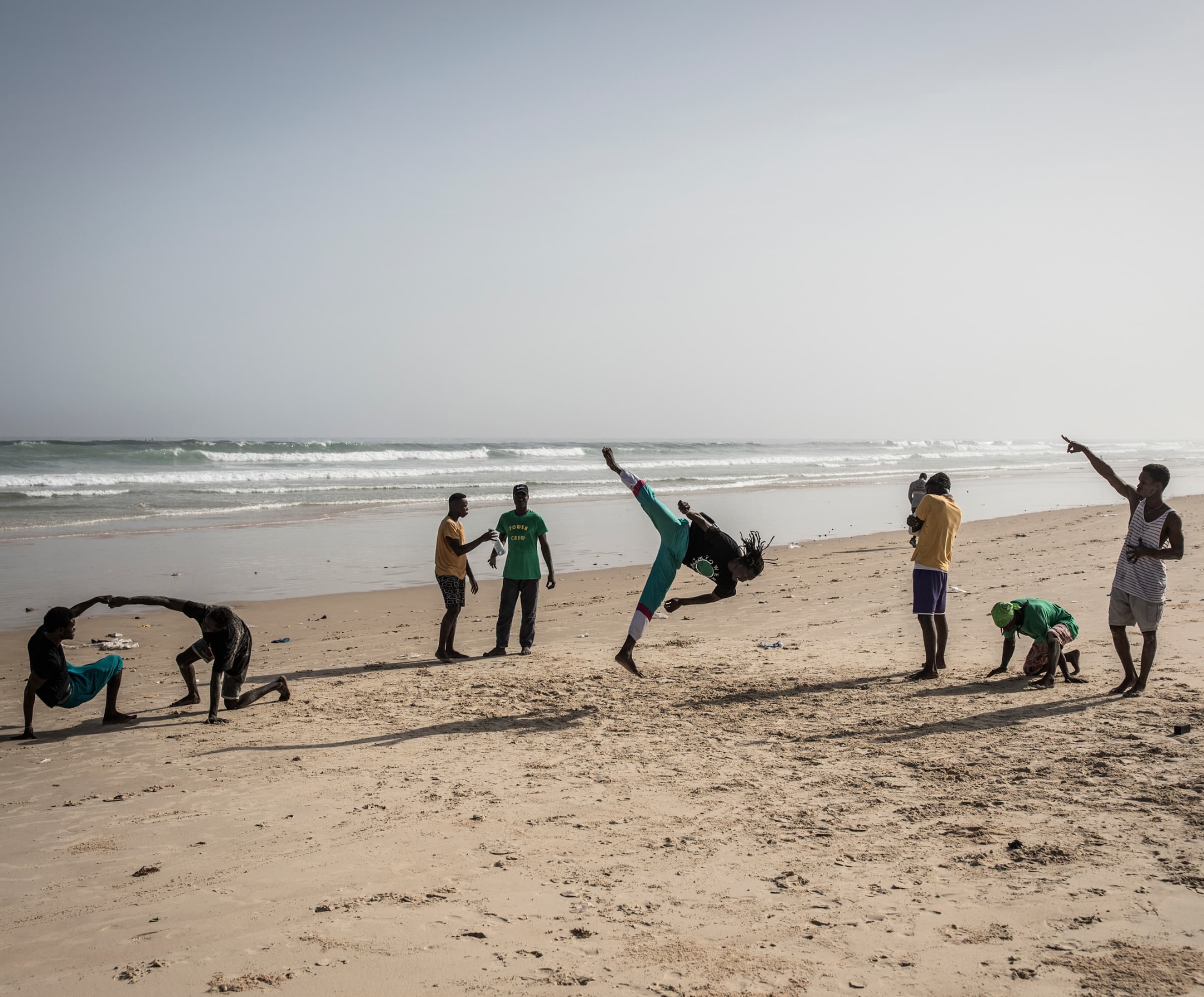Don't miss the last day to order. Learn More.
The Future of Breakdancing Is at This Beach
Community
Athletes in Dakar, Senegal, perform their physics-defying moves in the whitewater.

"Points of Play" is a series spotlighting the places where sport brings communities together.
On the shores of Dakar, a West African city surrounded by beaches on three sides, you'll find a bustling hub of creativity and athleticism. On any given day on Yoff Beach, where sand stretches along the northern coast of Senegal's capital, fishermen pull in the day's catch while surfers ride the rolling swell. Runners jog past a heated game of kickabout beach football, dodging loose balls. A wrestling team grapples in pairs, the sun baking their backs. And at the centre of it all, an uncommon beach activity takes the stage: breakdancing.
Xavier Goudiaby does a "salto costal" as the tide goes out.
This aerobic style of street dancing may be a surprising sight on any other beach—but not this one. Dancers who typically train in gyms and on the streets have joined the bustling beach scene at Yoff to practise and perform on its natural sandscape, which they say improves their moves and impresses passersby.
"I have a routine of coming to the beach to watch the different sports activities we do here", says Amadou Sow, a Yoff Beach regular. Amadou says he's impressed by the skill level of the breakers on Yoff, and sees their training here as a path to becoming paid professionals. "Breakdancing is extraordinary. It's very nice to watch", he says.

Practising in the surf, the Power Crew discovered a cross-training approach to build endurance and agility.
"There is solidarity ... There is power in this".
Xavier Goudiaby

Francis Bampoky (front left) helps Xavier complete a "salto" as the Power Crew looks on from the waves.
Stealing the scene here since 2013 is the Power Crew, a group of seven dancers who train at Yoff Beach mid-afternoons twice a week to improve their energetic street performances. "The sand helps with endurance and building force", says the crew's 27-year-old leader, Xavier Goudiaby. "We thought, 'Why not bring this to dancing?' Once we were back on the floor, we were faster".
The crew learned that the uneven and constantly shifting sand and built-in resistance of shallow water helped to maximise their agility and strength—and thus minimise their need to hit the gym to cross-train. "In the sand, you're doing that already", says Xavier, who, with a seemingly effortless backflip above the shoreline, proves this approach helps take their moves to the next level.
Demba Ndiaye wraps up a street performance with the Power Crew while locals gather around to watch and learn.
Demba Ndiaye, 24, says he became interested in the sport after "going to a cybercafé to watch videos of breakdancing". With the help of those videos, training alone and without music on a basketball court, he taught himself the technique. Xavier saw Demba practising one day in 2019 and invited him to join the Power Crew.
Breakdancing has been on the rise in Dakar since the '80s, when hip-hop music entered Senegalese culture on the waves of French TV programmes and musical souvenirs brought back from the States. Now, on most days in the city, locals come out to watch groups like the Power Crew perform. Neighbourhood kids wait patiently on the sidelines hoping for pointers, like how to do a headstand, from the pros.

Emmanuel Goudiaby performs a "clash" during a training session.
While the style of dance has been around Dakar for many decades, organised breaking only recently made its way to the city's beaches. Since residents often work out there, the breakers have been right at home. "Yoff Beach is very accessible", says Furbain Poaty, a beach regular. "There are athletes who come from all over Dakar [to train here], because the beach is very wide".
Yoff is also uniquely suited to athletes, Furbain says, because it's not rocky and the expansive stretch of forgiving sand makes for softer falls.


At Yoff, Xavier and his crew often train alongside beachgoers. They say they hope by coming to the beach they can raise awareness for their sport and entice potential new dancers. "We come to the beach to let other people know about breakdancing", says Joel Mané, a former Power Crew member now helping to manage the group. "We want to share what we do with other people".
Sometimes, curious beachgoers enquire about their physics-defying moves. "They ask if they can do this", Xavier says, referring to breaking on the beach. "We say, 'Of course'".

The Senegalese often describe their nation as "pays de la Teranga", which essentially means "a country that welcomes and respects you". At Yoff Beach, locals welcome one another into their respective sports, and ask "Nagadef?", which means "How are you?" in the local language, Wolof. Horse-drawn carts roll across the sand, hauling the daily catch from the beach to local restaurants and shops. There is solidarity", Xavier says, of this place. "People say, 'There is power in this'"", he adds, of his sport.

Xavier holds himself in a "freeze Y" on Yoff Beach.
No one is out of place on the beach. And beach breaking, though surprising, actually fits in perfectly: hip-hop dance culture has deep roots in traditional African dance. So in many ways, by popping up in Dakar at places such as Yoff Beach, breakdancing is returning home.

Words: Kimiya Shokoohi
Photography: John Wessels
Reported: September 2020


